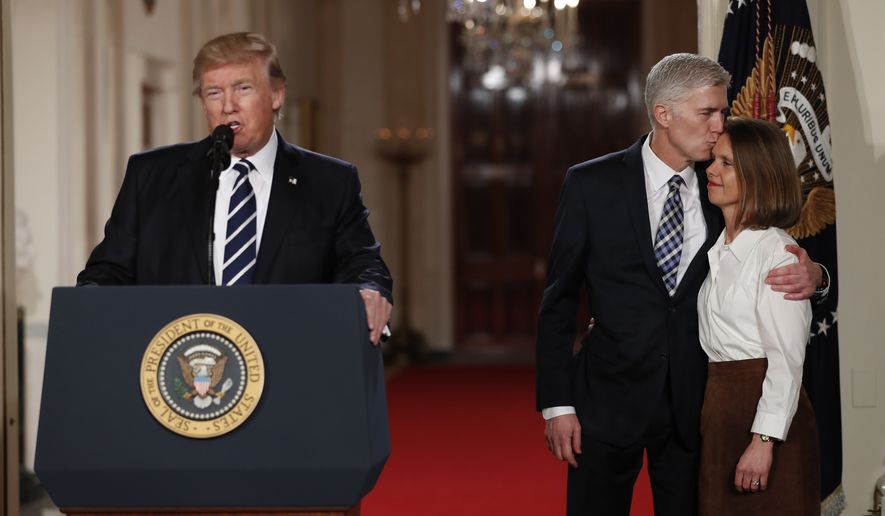President Trump on Tuesday nominated Judge Neil Gorsuch to the empty seat on the Supreme Court, kicking off the biggest test of his young administration with Democratic senators already itching for a fight.
Judge Gorsuch is a favorite of conservatives, who say his legal mind and clear writing are fitting for someone picked to fill the seat of the late Justice Antonin Scalia. The president dubbed him “the very best judge in the country.”
Liberal groups, though, demanded a battle, and Democratic senators said they’ll oblige. Only minutes after the announcement, Senate Minority Leader Charles E. Schumer, New York Democrat, announced plans for a filibuster to block the judge.
Mr. Trump, meanwhile, basked in the showmanship, keeping his pick secret until the end, and declaring Judge Gorsuch a campaign promise kept to conservative voters.
“I took the task of this nomination very seriously,” the president said as he introduced his nominee at the White House on Tuesday night. “Judge Gorsuch has outstanding legal skills, a brilliant mind, tremendous discipline, and has earned bipartisan support.”
The pick immediately drew praise from conservatives, including an outpouring of support from Senate Republicans who said the judge’s legal record was encouraging.
SEE ALSO: Neil Gorsuch an ideal Antonin Scalia replacement, conservative legal scholars say
“He’s awesome. He’s fantastic,” said Sen. Mike Lee, a Utah Republican who was on Mr. Trump’s list of prospective nominees for the high court.
But the nomination also quickly came under fire from liberal groups that questioned his views on gun control, abortion and contraception, environmental protection and the role of campaign contributions in politics.
Democratic senators said as Mr. Trump’s pick, and given the controversial moves the president has already made in his tenure, the judge will be given extra scrutiny.
Several Democrats said they’ll test Judge Gorsuch to see if he will serve as a check on Mr. Trump.
Judge Gorsuch has served 10 years on the 10th U.S. Circuit Court of Appeals in Denver, writing notable opinions on Obamacare’s contraceptive mandate, where he said religious groups’ objections needed to be respected.
Those decisions made him a favorite of pro-life leaders.
Judge Gorsuch said Tuesday that Mr. Trump had “trusted me with a most solemn assignment.” He pledged that, if confirmed, he would labor to live up to the stand set by Scalia, whose death in February 2016 created the vacancy.
“Justice Scalia was a lion of the law. Agree or disagree with him, all of his colleagues on the bench shared his wisdom and his humor. And like them, I miss him,” Judge Gorsuch said.
He cast himself firmly in the Scalia mold of a judge who wouldn’t place his own views over his duty to follow the law.
“In our legal order it is for Congress and not the courts to write new laws. It is the role of judges to apply, not alter, the work of the people’s representatives,” he said. “A judge who likes every outcome he reaches is very likely a bad judge.”
Senate Democrats will have to explain their newfound distaste for the judge. The Senate confirmed him for the federal bench in 2006 by a unanimous voice vote, including support from Mr. Schumer and then-Sens. Barack Obama, Joe Biden and Hillary Clinton.
But Democrats say things changed after the way the GOP handled the seat following Scalia’s death.
Mr. Obama nominated Judge Merrick Garland of the U.S. Circuit Court of Appeals for the District of Columbia for the seat, but Republicans refused to hold a hearing or allow a floor vote, sparking enmity that remains among Democrats.
The court, meanwhile, remained at eight justices, producing a handful of 4-4 deadlock rulings on major issues.
Mr. Trump’s pick would shift that balance.
The nomination fulfilled a big campaign promise for Mr. Trump, whose pledge to put a conservative justice on the high court helped galvanize support from conservative voters leery of the New York billionaire who unexpectedly captured the GOP nomination for president.
To prove his promise, Mr. Trump took the unusual step of promising to make his pick from a list of 21 jurists who had the stamp of approval from conservative leaders.
Judge Gorsuch was on the list.
Mr. Trump gave a nod to the importance voters placed on his pick for the high court.
“Millions of voters said this was the single most important issue to them when they voted for me,” said the president. “I am a man of my word. I will do what I say, something that people have been asking for form Washington for a very long time.”
Exit polls showed that 70 percent of voters in the presidential election said the Supreme Court pick was an important factor in their decision. Of the 21 percent who cited it as the “most important” issue in the presidential election, 57 percent voted for Mr. Trump and 40 percent for Mrs. Clinton.
Despite the overwhelming support in the Senate last time, Judge Gorsuch can expect a bruising this go around.
Sen. Jeff Merkley of Oregon is leading fellow Democrats on a mission to filibuster any nominee by Mr. Trump as a payback for the treatment of Judge Garland.
Republicans, meanwhile, are debating whether to trigger the so-called “nuclear option,” a shortcut to change the rules and eliminate the 60-vote threshold for filibusters.
Democrats used that tactic in 2013 on all nominees save for the Supreme Court.
“Senator Schumer is about to tell Americans that Judge Gorsuch kicks puppies and heckles piano recitals. That’s hogwash,” said Sen. Ben Sasse, Nebraska Republican. “Democrats are working overtime to cast Judge Gorsuch as a reflexive partisan. But as I said when Justice Scalia died, there are no Republican or Democratic seats on the Supreme Court.”
• S.A. Miller can be reached at smiller@washingtontimes.com.




Please read our comment policy before commenting.